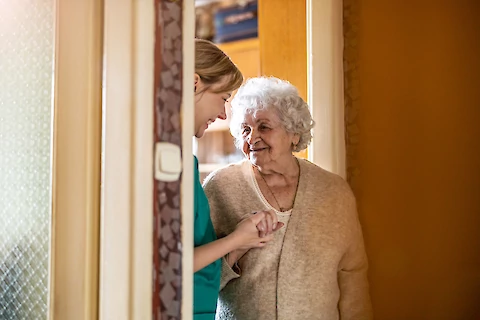
Conversations about sundowning can be challenging, but they are essential for understanding and addressing the unique needs of a senior loved one with dementia. One such topic is sundowning, a phenomenon where individuals with dementia experience heightened confusion and anxiety during the late afternoon and evening hours. It can be particularly challenging to navigate, especially with the changing seasons that can exacerbate these symptoms. This guide aims to provide adult children of seniors with dementia with a roadmap to fostering meaningful and effective conversations around sundowning. We aim to empower you with the knowledge to ensure your loved ones are receiving the care they need, reducing their anxiety and maximizing their well-being as they navigate their dementia journey.
Learn What Sundowning Entails
Sundowning is prevalent among seniors with dementia. It refers to a period of increased agitation, confusion, or restlessness that typically begins late in the afternoon and extends into the evening. As the sun sets, behavior can change significantly. This presents a new set of challenges for those caring for a dementia patient.
Discover How to Recognize Sundowning Signs
Watch for signs of increased confusion or agitation as the day progresses. Sundowning might manifest as increased forgetfulness, irritability, or even hallucinations. Remember, changing seasons can impact the timing of these symptoms due to changes in daylight hours.
Carefully Initiate Conversations About Sundowning
Initiating a conversation about sundowning with your loved one might be daunting, but it is essential. Consider these three tips to initiate the conversation carefully.
1. Create a Safe and Comfortable Environment
Your loved one may be more open to having the conversation if they feel safe and comfortable to do so. Allow them to pick the place if it helps put them more at ease.
2. Be Sensitive and Reassuring
Make sure to express your observations and concerns with sensitivity and empathy. Be as reassuring as possible, and let them know you are only trying to help.
3. Listen
You'll also want to listen attentively. Let them express their feelings and experiences, and allow them to share what is on their minds without interruption. Emotional responses are a normal part of the process. It's important to approach them with empathy and understanding.
Strategies for Managing Sundowning
Management strategies for sundowning include maintaining a quiet, familiar, and calming environment, especially during the late afternoon and evening hours. Stay consistent with daily routines and limit caffeine and sugar intake to the early parts of the day. Encouraging physical activity and exposure to natural daylight may also help regulate sleep patterns and limit sundowning symptoms.
Seek Professional Help
Navigating sundowning can be an arduous task, and there comes a time when professional help may be needed. Trained dementia caregivers can provide the necessary support and implement effective strategies to manage sundowning. Senior Helpers Collinsville, for example, employs a team that is dedicated to providing compassionate and respectful dementia care.
Let Senior Helpers Collinsville Help You
Navigating the changes that come with dementia, like sundowning, can be challenging. However, understanding these shifts, initiating meaningful conversations, and seeking professional help when necessary can significantly improve your loved one's quality of life. If you live in Alton, Cottage Hills, Glen Carbon, Hartford, Lovejoy, or elsewhere nearby, reach out to Senior Helpers Collinsville for a hand. Contact us today to discuss the needs of your loved ones and how we can best assist you and them.